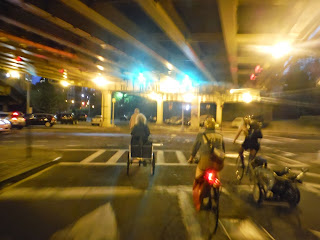I wasn’t going to stay in Austin long.
More than enough memories here of a decades past, between
childhood and growing up.
But my friends were out drinking at a roadhouse bar just north
of the Austin City limits before the conference I’d flown out for.
“Do you have family here?” they asked at dinner at Opal
Divine’s, over tortilla soup and Shiners.
“Not anymore,” I explained. “Buried dad last year. But my
family’s been here for ages. Great Grand mom in Bastrop, lost to fires a few
years ago. I can get stuck here. Find myself lost driving to Mexico with a six pack of beer."
I was only going to stay for the conference. And then get back to beloved Brooklyn.
But then I looked at the sky. The warm night, the trees, the breeze, and
the summer heat, sitting out for hours, where I’d sat for thousands of nights.
On the way to the elevator, hadn’t thought of Dad and
everyone else from here, from those years.
But then I looked at the sprawling, open hot Austin sky,
where we’d all and had a feeling I’d been here before, driven, stopped, just
been.
A trip down from Dallas in summer 1989, when I had no money,
and everyone took care of me, telling me they did not care. I was welcome. They were glad I’d come. We floated down the brazos, shared a shower,
and talked all the way back to Dallas, feeling a part of everything, the sky, the
road, the music, the ruins the ages. We
were part of everything. The sky was us and we it, created illusions,
hallucinations, a mirage in the distance, oil disappearing in the distance,
just as we get close to it. Now, I can never touch it. But I’ve been chasing it. And it keeps reminding me that it will never
really go away.
But for a moment, we were of it, it was of us, our colors shone and we reflected, in the Dallas skyline, talking and recalling and being.
Drove back and forth and back and forth, saying goodbye,
back out west, to South by Southwest for Spring break, and back through the
gulf coast, a dingy hotel in Nola, hot on the Mississippi Sound, and back up
the Palisades.
And back and forth, one more trip back in 1991, to say
dance, drink beer, share, and say goodbye before a trip to Italy, even if we
didn’t want to remember how much had happened since that first trip in 1989,
driving in the country and laughing and dancing through a thousand shows, still
kids at the cusp of something between youth and adulthood, between the city and
the country, whirling across the state, back and forth to South by Southwest,
shows in Ft Worth, back to Austin summers.
And then it was over, a chapter
was closing, that part of our life like a mirage, disappearing in the distance.
And then it was over, never to get back.
“Lets stay together” played on the tape machine as I looked
at the Austin sky leaving the city in the distance, off to Italy, Germany,
California, Los Angeles, Joshua Tree, San Francisco, and another other life,
extending from Chicago back to Yonkers.
We were not staying together.
“You’re childhood is over.
Your childhood is gone,” Robin Hitchock reminded me as I drove around
San Francisco years later, going to see Johnny Cash at the Great American music
hall, finding another city, another life, seeing Robin play, dancing to hip
hop, while Don Cherry played, merging jazz and world beats, to a different
chapter of what would be, away from that Austin sky. I never really wanted to
go back.
Dad wasn’ t there to visit me this time in Austin. Last
summer his ashes found their way back into the forests here, through the Bayou,
outside of preservation hall, and a taco stand outside of Houston, escaping the
highway off road forever. Not here to
meet me at the conference to meet up for a drive to and from, New Orleans, or
Mexico, or San Antonio, or Dallas, or Castroville, as we’d done so many
thousands of times before. Only notes I
found in the back of an old book I carried
from an old conversation on the way to New Orleans about Matthew, the
book of luke, beatitudes in healthier
days, now long past, rarely to return.
After that, on every trip he got weaker until he could not leave the
house. This time, he was with me on the
road, in the Austin sky.
When I look at it, it reminds me my life has held many
things, many gifts, many friends, and my family, a great grandmother who lived
99 years, originating from here, bearing her three sons, and then my life, and
those wandering adventures that are gone, disappearing memories, mirages,
appearing and reappearing in the distance on the hot Texas road.
I wasn’t going to stay for long. Too many memories here, in
the Texas sky.


















































































